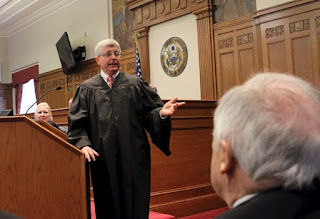The Regular Use Exclusion May Not be So Regular Anymore
By Daniel E. Cummins | March 31, 2022

Recent state and federal decisions have confirmed that there has developed a split of authority in the state and federal trial and appellate courts over the validity and enforceability of the regular use exclusion.
Most automobile insurance policies contain a regular use exclusion. That provision provides that coverage under that particular policy is excluded whenever the injured party was injured while in a vehicle that was regularly available for the use of the injured party but that was not covered by the insurance policy at issue. The basic rationale behind this exclusion is that a carrier should not have to provide coverage to an injured party where, unbeknownst to the carrier, the injured party regularly used another vehicle that was not covered under the carrier’s policy because the carrier was not paid a premium by the injured party to cover that risk.
Research reveals that the regular use exclusion has been upheld in Pennsylvania state trial court decisions dating back 65 years, see Burger v. Indemnity Insurance Company of North America, 7 Pa. D. & C. 2d 683 (C.P. Lyc. Co. 1956), and in Pennsylvania appellate state court decisions dating back to at least 34 years ago in the case of Wolgemuth v. Harleysville Mutual Insurance, 535 A.2d 1145 (Pa. Super. 1988).
With the plaintiffs bar being emboldened by a slew of recent Pennsylvania Supreme Court decisions overturning decades of precedent on a wide variety of personal injury civil litigation issues for the benefit of plaintiffs, the plaintiffs bar recently turned their sights on attacking the continuing validity of the regular use exclusion. In fact, as noted below the plaintiffs bar has had recent success in this regard and is currently attempting to push this issue up to the Supreme Court.
The ‘Rush’ Case
In a case that history may come to call the case that marked the beginning of the end of the regular use exclusion, plaintiffs attorney Mark Altemose of the Bethlehem, Pennsylvania office of Cohen, Feeley, Altemose & Rambo was able to convince Northampton County Common Pleas Court Judge Stephen G. Baratta to find that the regular use exclusion violated Pennsylvania’s motor vehicle financial responsibility Law [MVFRL] in the case of Rush v. Erie Insurance Exchange, No. C-48-CV–2919-01979 (C.P. Northampt. Co. June 29, 2020 Baratta, J.).
In Rush, Baratta of the Northampton County Common Pleas Court granted partial summary judgment to the injured party plaintiffs after finding that Erie’s regular use exclusion violated the MVFRL.
According to the opinion, the plaintiff was a police officer who was injured while driving a police vehicle that was regularly available for his use at work. With regards to this matter, the plaintiff was seeking UIM coverage under his personal automobile insurance policy.
The trial court found that the regular use exclusion at issue violated the MVFRL in two respects. First, the court in Rush referred to the Pennsylvania Supreme Court’s household exclusion decision in Gallagher v. Geico and found that the regular use exclusion in this case was invalid as a “disguised waiver” of UIM coverage when the MVFRL requires the carrier to secure written waivers of such coverage from the insured during the application process or otherwise.
Secondly, under a rationale previously set forth in Slupski v. Nationwide Mutual Insurance, 801 Fed. Appx. 850 (3d Cir. 2002), the trial court in Rush found that, because the plaintiff was entitled to liability/medical coverage of $250,000 for his injuries from the accident, the regular use exclusion was also found to violate 75 Pa.C.S.A. Section 1734, which mandated the carrier to provide UIM coverage equal to the bodily injury coverage available absent a written waiver secured from the insured.
Thereafter, in a case appellate first impression in the same matter of Rush v. Erie Insurance Exchange, 265 A.3d 794 (Pa. Super. Oct. 22, 2021 Bender, P.J.E., Dubow, J., and Stevens, P.J.E.), the Pennsylvania Superior Court held that the regular use exclusion found in motor vehicle policies is unenforceable because it violates the MVFRL. However, the Pennsylvania Superior Court utilized a different rationale than that voiced by the trial court in Rush to invalidate the regular use exclusion.
The Superior Court in Rush noted that the plaintiff was injured in a car accident, he was legally entitled to recover from the underinsured tortfeasors, and Erie had never obtained a 75 Pa.C.S.A. Section 1731 written waiver or rejection of UIM coverage from the plaintiff (rather, the plaintiff had chosen to purchase stacked UIM coverage). In ruling that the regular use exclusion was unenforceable, the Superior Court found that the regular use exclusion impermissibly limits the scope of UIM coverage required by Section 1731 by precluding coverage if an insured is injured while using a motor vehicle that the insured regularly uses but does not own.
Quick Fallout From the ‘Rush’ Case
The impact of the Rush decision is beginning to be felt by carriers through recent federal court decisions.
In the U.S. District Court for the Western District of Pennsylvania case of Johnson v. Progressive Advanced Insurance, No. 2:21-CV-01916-AJS (W.D. Pa. Feb. 23, 2022 Schwab, J.), the court denied a carrier’s motion to dismiss a plaintiff’s UIM claim in which the carrier was attempting to rely upon the regular use exclusion.
In its Feb. 23 decision in this Johnson case, the federal court noted that the Rush decision had been appealed to the Pennsylvania Supreme Court but that the Pennsylvania Supreme Court had not yet indicated if it would be accepting that appeal for review.
The carrier in this Johnson case attempted to argue that the regular use exclusion was still valid even though the Superior Court invalidated it in Rush. The insurance company attempted to cite to the Pennsylvania Supreme Court Opinion in Williams v. Geico Government Employees Insurance, 32 A.3d 1195 (Pa. 2011) as support for the continuing validity of the exclusion.
In Johnson, Schwab decided not to follow the Williams decision based upon a reasoning that the Supreme Court Williams decision was only a public policy-based decision and not statutorily-based decision as the more recent Superior Court decision in Rush was relative to the MVFRL.
The court in Johnson accepted the plaintiff’s argument that the regular use exclusion runs afoul of Section 1731 of the MVFRL, 75 Pa.C.S.A. Section 1731. As such, the district court denied the carrier’s motion to dismiss without prejudice to the carrier’s right to re-raise the matter should the Pennsylvania Supreme Court take up the issue and reverse the Superior Court decision in Rush.
On the heels of the Western District Court decision in Johnson, came the decision of U.S. District Court for the Middle District of Pennsylvania Judge Malachy E. Mannion’s decision in the case of Evanina v. The First Liberty Insurance, No. 3:20-CV-00751-MEM (M.D. Pa. Feb. 25, 2022 Mannion, J.). Mannion likewise found the regular use exclusion to be invalid under the same rationale as put forth by Schwab three days earlier in the Johnson decision. In the Evanina case, Mannion denied a carrier’s motion for summary judgment on a plaintiff’s UIM claim in which the carrier was attempting to rely upon the regular use exclusion.
Similar to Schwab’s decision in district court case of Johnson v. Progressive Advanced Insurance, Mannion in this Middle District Court case of Evanina decided not to follow the Pennsylvania Supreme Court’s decision in Williams and found that the Williams decision was only a public policy-based decision and not statutorily based decision as the more recent Rush decision by the Pennsylvania Supreme Court was relative to the MVFRL.
In his decision, Mannion also confirmed that the Pennsylvania Supreme Court had not yet addressed the validity of the regular use exclusion in the context of whether that exclusion runs afoul of Pennsylvania’s MVFRL. As such, Mannion stated that he was required to attempt to predict how the Pennsylvania Supreme Court might rule on this issue if faced with this issue.
Mannion reviewed certain recent Pennsylvania Supreme Court decisions such as the Gallagher v. GEICO decision and the Donovan v. State Farm decision in both of which the Pennsylvania Supreme Court had ruled that the household exclusion was invalid and, therefore, unenforceable. The court in this Evanina case noted that the household exclusion was “a substantially similar exclusion [as compared] to the regular use exclusion.”
As such, Mannion, in a prediction that is likely to be as accurate at predicting that the sun will rise in the East tomorrow, predicted that, “considering the trend of the Pennsylvania Supreme Court in its rulings,” if faced with the issue of the validity of the regular use exclusion, the Pennsylvania Supreme Court would likely find this exclusion to be invalid and, therefore, unenforceable. Accordingly, Mannion ruled in the same fashion and denied the UIM carrier’s motion for summary judgment as a result.
A Split of Authority
As noted, until the Rush decision, the regular use exclusion had been repeatedly upheld as valid through decades of decisions up through the Pennsylvania Supreme Court’s decision in Williams in 2011 and more recent unpublished Pennsylvania Superior Court decisions. See Rawl v. GEICO, No. 1086 WDA 2019, 237 A.3d 1042 (Pa. Super. 2020)[unpublished]; see also Eckert v. Unitrin Auto Home Insurance, No. 1013 EDA 2019 (Pa. Super. 2020)[unpublished].
As noted below, as the Rush decision was making its way up the appellate ladder, a number of other decisions came down in the state and federal courts upholding the continuing validity of the regular use exclusion and the notion that an injured party could not secure coverage that they did not pay for by way of any premium payments.
One plaintiff’s effort to rely upon the Gallagher v. Geico rationale to defeat a regular use exclusion was rebuffed by the U.S. District Court for the Western District of Pennsylvania in the case of Barnhart v. Travelers, 417 F. Supp. 3d 653 (W.D. Pa. Oct. 28, 2019 Horan, J.). The court in Barnhart specifically held that the Pennsylvania Supreme Court’s holding in Gallagher “does not extend to invalidate the ‘regular use exclusion’ or to overturn Williams as the controlling precedent” in support of the continued validity of the regular use exclusion.
Also, in the separate case of Nationwide Affinity Insurance Company of America v. Fong, No. 2:19-cv-02119-CFK (E.D. Pa. April 28, 2020 Kenney, J.)[not published], Judge Chad F. Kenney of the U.S. District Court for the Eastern District of Pennsylvania upheld Nationwide’s reliance upon the regular use exclusion.
The court in the Fong case noted that the claimants did not present any argument that the regular use exclusion was unenforceable on policy grounds. Regardless, the court noted that the regular use exclusion had been previously upheld by the Pennsylvania Supreme Court’s holding in the case of Williams v. Geico, 32 A.3d 1195, 1209 (Pa. 2011), in which it was held that the regular use exclusion was not void as against public policy. Notably, the court in this case also stated that the Pennsylvania Supreme Court’s separate decision with respect to the household exclusion in the case of Gallagher v. Geico “does not affect Williams’s precedent, as the facts of Gallagher are wholly distinguishable to the facts in the instant matter, as conceded by the defendants.”
In addition to writing the Fong decision, Kenney also wrote the decision in the case of Shepherd v. Talotta, 535 F. Supp. 3d 341 (E.D. Pa. April 22, 2021 Kenney, J.), in which the court upheld a regular use exclusion and, in the process, again rejected the plaintiff’s arguments under Gallagher v. Geico, as well as any public policy arguments.
It is also noted that, in the state court system, prior to the Superior Court’s decision in Rush, other trial courts are still ruling that the regular use exclusion was still valid. In the case of Conti v. Castillo-Rodriquez, No. S-269-19 (C.P. Schuylkill Co. Sept. 25, 2020 Russell, J.), the court granted summary judgment in favor of Erie Insurance based upon an application of the regular use exclusion.
During these motions for summary judgment proceedings, the carrier asserted that the regular use exclusion remained enforceable. The plaintiff argued that the provisions of Pennsylvania Motor Vehicle Financial Responsibility Law, in conjunction with the Pennsylvania Supreme Court’s decision in the case of Gallagher v. Geico, 201 A.3d 131 (Pa. 2019), in which the Supreme Court ruled that the household exclusion was invalid as a de facto waiver of stacked UM/UIM coverages, rendered the regular use exclusion invalid as well.
Relying, in part, on the case of Williams v. Geico, 32 A.3d 1195 (Pa. 2011), the court in this Conti case held that the regular use exclusion remained valid and enforceable under Pennsylvania law.
The court in Conti also noted that the majority in the Gallagher v. Geico case indicated that its decision was “narrow.” The judge in Conti also pointed out that the Pennsylvania Supreme Court in Gallagher “offered no opinion or comment on the enforceability of any other exclusion to UM or UIM coverage or to coverage in general,” citing Gallagher v. Geico at p. 138, n. 8.
As such, the court in this Conti case stated that, since the Pennsylvania Supreme Court had not abrogated the reasoning set forth in the Williams case, the decision and law of the Williams case was found to be controlling in that case matter. Given that there were no issues of fact to preclude the entry of summary judgment, the court in Conti applied the regular use exclusion and entered summary judgment in favor of the carrier and against the plaintiff.
Up the Ladder We Go
As noted, those in the motor vehicle accident law industry are awaiting a decision from the Pennsylvania Supreme Court as to whether that court will accept the appeal in the Rush decision and take on the task of deciding whether the regular use exclusion is valid and enforceable. Should the Pennsylvania Supreme Court decide to take the appeal, it will remain to be seen whether that court will choose to uphold decades of past precedent, including from the Pennsylvania Supreme Court itself, repeatedly upholding the validity of the regular use exclusion or whether the court will instead continue its more recent trend of overturning such established precedent in a manner that favors plaintiffs in personal injury litigations.
Daniel E. Cummins is the managing partner of the Clarks Summit law firm of Cummins Law, a civil litigation practice. He also conducts mediations of civil litigation matters through Cummins Mediation Services. Cummins is also the sole creator and writer of the Tort Talk Blog (www.TortTalk.com), which is designed to provide continuing updates on important cases and trends in Pennsylvania civil litigation law. He can be reached at dancummins@CumminsLaw.net.




































